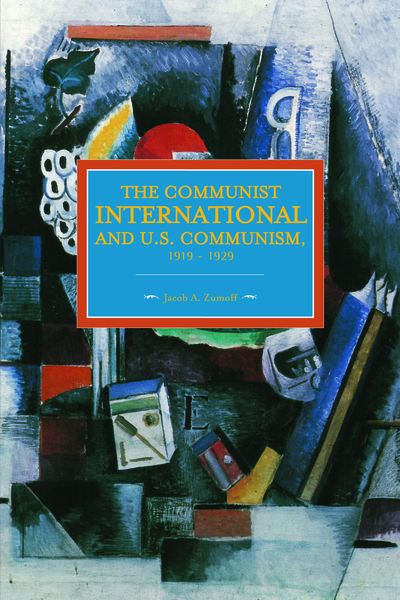Jacob A. Zumoff, New Jersey City University
Since the Cold War, most historians have set up an opposition between the “American” and “international” aspects of early American Communism. This book examines the development of the Communist Party in its first decade, from 1919 to 1929. Using the archives of the Communist International, this book, in contrast to previous studies, argues that the International played an important role in the early part of this decade in forcing the party to “Americanise”. Special attention is given to the attempts by the Comintern to orient American Communists on the role of black oppression, and to see the struggle for black liberation and the fight for socialism as inextricably linked. The later sections of the book provide the most detailed account now available of how the Comintern, reflecting the Stalinisation of the Soviet Union, intervened in the American party to ensure the Stalinisation of American Communism.
Biographical note
Jacob A. Zumoff, PhD (2003) in history, University of London, has lectured at several universities, including as a visiting professor at the Instituto Tecnológico y de Estudios Superiores de Monterrey and, most recently, New Jersey City University. He has published on the labour movement and racial oppression in the Americas.
Readership
Those interested in the radical left and labour movement in the United States; the struggle for black equality; the history of the international Communist movement, as well as political and intellectual historians more generally.
Reviews
” […] este libro se convertirá en la obra de referencia sobre los primeros años del PC norteamericano. Al mismo tiempo, brinda elementos claves para el análisis comparativo con otros partidos comunistas y contribuye a una historia global de la IC.”
Hernán Camarero (UBA – Conicet), Archivos de historia del movimiento obrero y la izquierda, año IV, nº 8, marzo de 2016: 173-176.
“In many ways Jacob Zumoff’s recent in-depth look at the earliest years of the Communist movement in the U.S. affirms Theodore Draper’s earlier work, but it has much to offer on its own, especially in today’s political climate. […] What makes Zumoff’s work particularly relevant, in addition to his use of Russian sources, is what it says about the political realities of today, particularly pertaining to the [US] election of 2016.”
Beverly Tomek, WorkingUSA: The Journal of Labor and Society, September 2015, pp. 516-518.
“Jacob Zumoff’s book is a major contribution to the history of the CPUSA and of the Communist International itself in its first decade. Based on meticulous scholarship and rigorous analysis, it will become the standard text on the party’s first decade. But, more importantly, the book also serves as a vital tool for those who today view the history of the early Communist International – and the successes and failures of the CPUSA – not merely as a topic of historical enquiry but as a crucial programmatic component for today’s struggles to build a party that can lead a successful workers’ revolution.”
Tony Collins, Marx and Philosophy
“[…] this fully indexed book, with extensive footnotes and references, will be of enduring value as a reference work for avowed socialists as well as scholars of communism. It is also a fun and interesting read and belongs in the toolkits of everyone seeking a coherent revolutionary program and lessons on building an organization capable of leading the working class in revolutionary struggle to sweep away capitalist imperialism.”
Workers Vanguard No. 1067, 1 May 2015
“[…] this fine book stands as a major contribution to the history of Communism in the United States.”
Paul Le Blanc, Labour/Le Trevail (2015)
“Zumoff’s book belongs in all research libraries and in big city public libraries.”
Dan La Botz, New Politics, February 27th, 2015
“The Communist International and US Communism, 1919-1929 is a detailed, nuanced book that analyses a very important period in U.S. communist history. It is a book worth reading. And reading again.”
Tony Pecinovsky, People’s World
“This book deserves a much more detailed examination and review than we are able to bring in this last issue of NWF.
[…] – labor scholars will find it interesting.”
Gerry Henkel, New World Finn, January-March, 2015 Winter, p. 21
Table of contents
Abbreviations
Acknowledgements
Introduction: History and Historiography of American Communism in the 1920s
1: The Formation of the Communist Party, 1912–21
2: The Fight for Legality
3: Communists and the Labour Movement
4: William Z. Foster and the Turn towards the Labour Movement
5: The Farmer-Labor Party
6: The La Follette Fiasco, 1923–24
7: The Double-Edged Sword of ‘Bolshevisation’, 1924–26
8: The Foreign-Language Federations and ‘Bolshevisation’
9: Factionalism and Mass Work, 1925–27
10: The death of Ruthenberg and the Ascension of Lovestone, 1926–27
11: Lovestone between Bukharin and Stalin, 1927–28
12: The ‘Third Period’, the Sixth Congress and the Elimination of Opposition, 1928–29
13: Lovestone becomes a Lovestoneite, 1928–1929
14: The ‘Negro Question’ to the Fourth Comintern Congress
15: The ‘Negro Question’ from the Fourth to the Sixth Congress
16: The Sixth Congress and the ‘Negro Question’
17: ‘Self-Determination’ and Comintern Intervention
Conclusion
Bibliography
Index


